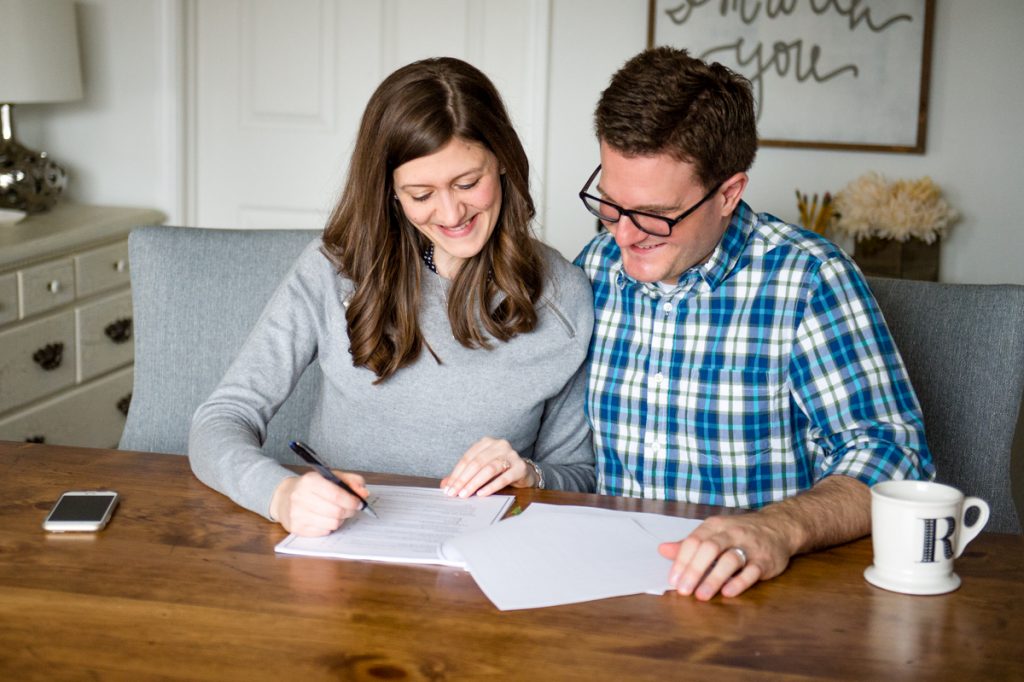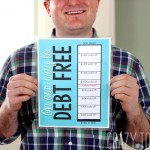When we shared our blog post on Seven Extravagances We Live Without, we received so much great feedback from our readers. There were many helpful comments and great perspectives to consider, but the biggest discussion was about not having a credit card and building credit (especially since, as many of you know, Maria and I are saving to buy a house). All of your concerns about the impact not having a credit card would have on our credit scores were not something we anticipated, but Maria and I talked and thought we should explore it more.
So, let’s have an even deeper discussion about credit scores: what they are, what they do and what they don’t. I’ll also share why Maria and I don’t worry about our personal credit score (even though we currently have no debt or credit cards) and ways that other like-minded, debt-free or debt-averse people can still have buying power, especially when buying a house, without the help of a credit score.
Our Philosophy: No Debt
Before we get into the specifics of credit scores, you should know the foundation from which Maria and I approach all money questions: we, as a rule, avoid debt at all costs. We don’t even owe money on our cell phones; we just bought them outright. We didn’t work so hard to pay off my student loans just because that was the only debt we cared about paying off. We paid off EVERYTHING.
If you haven’t read any of Dave Ramsey’s books or participated in Financial Peace University, this may sound somewhat crazy. Why would we try so hard to avoid debt? Because it’s a weight that drags you down. Even the wealthy agree. When asked what youth need to do to secure their financial future, Warren Buffett (one of my personal heroes and one of the richest people ever) said:
“not having debt when that gun goes off when you get out of school is a huge plus over being behind the game. … But put aside a few dollars for yourself so that when the time comes and you enter the workforce, you’re ahead of the game and not behind. And then, once you get there, don’t get behind by buying a whole lot of things that you figure you’re going to pay for someday …”
Humanity has long had a love-hate relationship with debt. Proverbs 22:7 states that “the rich rule over the poor, and the borrower is slave to the lender.” A well-known (in his day) Latin writer named Publilius Syrus wrote that “Debt is the slavery of the free.” Adam Smith, the founder of economics, wrote “What can be added to the happiness of a man who is in health, out of debt, and has a clear conscience?”
Now, even Dave Ramsey realizes that buying a house is very difficult for most people without using mortgages. So his plan does allow for mortgages, but within certain limits. So, suppose that you want to follow Dave Ramsey’s steps, cut up your credit cards, but still get a good mortgage so you can buy your own home. How does one go about doing that? Shouldn’t you worry about your credit score if you’re cutting up all your credit cards?
OK, Got It. So What Are Credit Scores?
Most banks give out mortgages (and other loans) based mainly on your credit score. So it is very important for you to understand what a credit score is.
A credit score is supposed to be a way of measuring in one, simple number how good you are at paying your bills on time. That way, credit card companies and banks can just look at a number and decide how much they are willing to lend to you. But, how do you calculate that number?
There are lots of credit scores out there, but the main one is the FICO score. The exact formula is a trade secret, but we do know some things that go into the calculation of a FICO score:
- 35% of your score is your on-time payment history. Your score will go down if you have late or missed payments, judgments, settlements, bankruptcies, etc.
- 30% is the amounts you owe. This includes the total amount you owe, the amounts you owe for different categories of debt (mortgage, credit cards, etc.), the percentage of available credit you are using (like the percentage of your credit card limit), how many accounts you have with balances, and how much you have paid down on your debts compared to the initial amount of that debt.
- 15% is the length of your credit history, including how long you have had your accounts and how long it has been since you used them.
- 10% is new credit (new debt) you have incurred, including the number of new accounts, the number of inquiries you receive, and how long its been since you opened an account.
- 10% is the mix of your types of credit and debts.
Alright, But What’s Your Beef with FICO?
My problem with FICO (and most of the other credit score systems) is how debt-focused it is. Most of the factors in a FICO score seem reasonable at first glance, but the formula requires you to have debt. To have a score AT ALL, you have to have debt. This is why Dave Ramsey calls the FICO score the “I Love Debt” score. So you either have to have a credit card and continually pay it off, or you have to keep getting other loans in order to have a score, period.
There are a whole list of problems that people have pointed out with the FICO score.
- For one, it doesn’t usually factor in on-time payment of other obligations, like utilities and rent.
- For another, FICO does not factor in your total assets. Someone with no credit score and a million dollars in the bank looks like a bad bet based on the FICO score alone, even though they have a ton of money available.
- Nor does the FICO score look to see if you spend less than you earn. You’re not likely to pay your bills for long if you spend more than you bring in, which you would think would be important to a lender.
Even with all those other criticisms, I think the underlying philosophy of the FICO score is the main problem. If you do not want credit cards, FICO just doesn’t make sense. It excludes an entire category of people. Continually owing money is not the way I want to live. And since FICO requires you to continually borrow money, Maria and I have decided to work around it.
But How Do you Get A Mortgage Without a Credit Score?
I’ll be the first to admit, having a good credit score does make getting a mortgage (and a lot of other things) a lot easier. Despite the Great Recession, mortgages are still basically given based on your credit score (whether or not that’s a great idea). And being able to qualify for a good mortgage is crucial to buying a home.
But Maria and I made our decision to live a debt-free lifestyle, so we have to look for ways around credit scores. And if you decide to live like no one else, you need to find ways to work around credit scores, especially if you are trying to buy a house with a mortgage.
I want to make a full disclosure here. As you may know, Maria and I are saving for a house. Lately, we have been looking at our finances and we are considering saving enough to just pay straight cash when we buy our house, no mortgage. It would take several years of saving and we haven’t decided 100% yet if we are going to go that route. If we do, qualifying for a mortgage won’t be a problem for us because we won’t need one. We realize that we are in a unique position here and that is simply not an option for most people. Heck, it might not even be an option that we take. But that does not change our point of view on the issue of debt and credit scores.
Ok, back to how we intend to work around credit scores while living a debt-free life.
You Probably Already Have a Credit Score
Before we even talk about ways to find a mortgage without a credit score, there’s one possible easy way out: you might already have one. If you’ve had debt or a credit card in the recent past, or are working on paying off your loans, you most likely already have a credit score. So, there’s no need to work around not having a credit score; you have one.
I’ve never had a credit card, but I definitely had student loans. Because of those student loans, I always had a credit score. I bet many of you have loans that you’re working to pay off or have recently paid off. And while you are paying off those loans, and for a few years afterwards, you will have a credit score on file.
Will your credit score be amazing? Probably not. Mine was in the low 700’s and has probably sunk lower since we paid off my loans (which is another reason that credit scores are calculated poorly: scores go down when you pay off debt. How counter-intuitive is that?). But relying on the payment history from those student loans allowed me a decent enough credit score to qualify for my mortgage and a car loan (also pre-Dave Ramsey). And it should do the same for you if you have a loan outstanding or recently paid off.
Step 2: If You Don’t Have a Credit Score
Ok, supposing you don’t have a credit score. How do you get a mortgage without a credit score when so many banks rely on them?
In that case, you need to find a bank or credit union that does manual underwriting. Manual underwriting means that your lender, instead of relying on your credit score, will determine how risky you are using their own formula. They’ll ask a bunch of questions about you and how you handle money. The biggest factors here are if you make your payments on time and that you earn more money than you spend. So always be sure to pay your bills on time and always limit your spending to less than you earn. Both of which are sound, basic pieces of financial advice you should be doing anyway.
A few years ago, getting a manually underwritten loan was much harder to do. But it is getting easier as more and more banks realize that they need more than a credit score to determine if they should lend to someone. Heck, even the federal government is worried about the number of people who don’t have credit scores and that they are excluded from getting loans and buying homes.
Manually underwritten loans are still uncommon, take longer to process, and are not nearly as convenient as getting a loan with a FICO score. However, we have knowingly made the decision to not have any loans or credit cards, so this doesn’t scare us.
Suppose You want a Credit Score or Want to Improve Yours. What do You do?
If you need to get a credit score to get a mortgage, the options are pretty slim for the debt-free person. However, there are a few things you can do without getting a credit card or more loans to get or improve your score. Here’s a few of them:
- Some landlords (mostly larger ones) report rent payments to credit agencies. Talk to your landlord to see if they do. Same with some utilities, so you should always make sure to pay your bills on time.
- Always check your credit report to ensure that everything on it is accurate. This is also a good policy to avoid identity theft. The federal government requires the three main credit agencies to give you free copies of your credit reports annually. Instead of getting all three at once, you can spread them out and get one every four months and continually keep an eye on your identity. Just go to Annual Credit Report and get yours. Please note that your free credit report WILL NOT have your credit score on it.
- Pay down your debts and credit card balances. Even the folks at FICO agree: “This is easier said than done, but reducing the amount that you owe is going to be a far more satisfying achievement than improving your credit score. The first thing you need to do is stop using your credit cards.” (emphasis added). That’s straight from the horse’s mouth, folks.
There are other ways to build up your credit score, but almost all of them involve getting a loan or a credit card, which we don’t want to do. If that’s the route you want to go, there’s plenty of other advice out there to help you with that.
Maria and I are so excited to finally be able to purchase a new house, but we refuse to have any debt along the way. Yes, it’s true that a debt-free lifestyle will eventually diminish our credit scores, but we are ok with that. We just can’t get on board with a system that perpetuates a cycle of debt. The good news is that there are options for obtaining a mortgage, even if you don’t have any open lines of credit. It can require a little extra work and research on your part, but we think you will agree that the financial independence will be worth it in the end.











